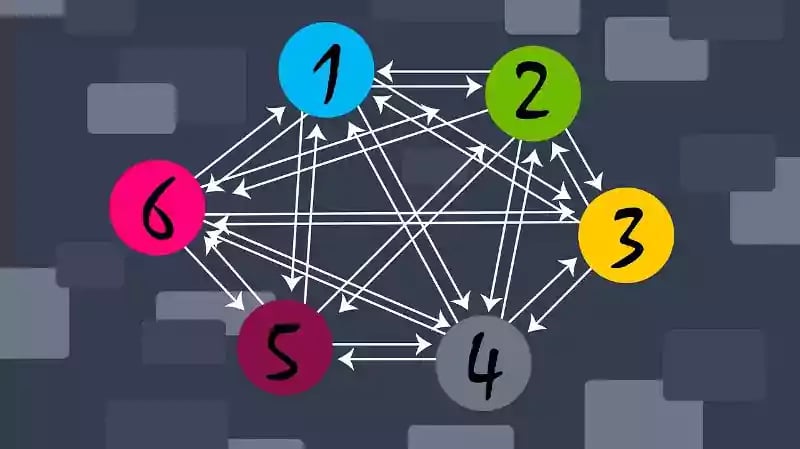Unlock SEO success: Learn how we use HubSpot Content Hub for SEO, boost rankings, increase organic traffic, and optimize our content for success.
Why Ethical Link Building is Key to SEO Success
Link building is a crucial aspect of any successful Search Engine Optimization Strategy (SEO), but it's not for the faint of heart. It takes time, effort, and a lot of careful thought to create a solid network of backlinks that will boost your rankings and improve your click-through rates (CTR). There are no shortcuts, easy solutions, or magic tricks to get you there.
It's all about manual labor, careful planning, and constant updates. Mindset and grindset.
This difficulty creates ethical issues around link building. To circumvent problems and try to cheat the system, marketers can feel tempted to use questionable or even unethical practices. This article will detail link-building practices and how to stay ethical when building a solid SEO foundation.
Why Does Link Building Matter?
-
92% of marketers believe that backlinks are still important for SEO. The importance of backlinks in search engine rankings cannot be overstated. To improve their SEO, businesses should prioritize the creation of high-quality backlinks. [Source: Backlinko]
-
The average website has 1,336 backlinks. Although backlinks are no longer as rare as once, they still have intense competition for them. This means businesses should prioritize creating high-quality content that other websites will want to link to build their backlinks. [Source: Ahrefs]
-
The top 10% of websites receive 90% of all backlinks. It's no secret that only a few websites receive most of the backlinks. Thus, businesses must prioritize obtaining backlinks from high-quality websites to boost their SEO. [Source: Moz]
-
The average backlink is worth 0.84 PageRank. Backlinks are crucial in improving a website's PageRank, and businesses should prioritize creating high-quality backlinks from websites with high PageRank to achieve this. This emphasizes the importance of ethical link-building practices and abiding by search engine guidelines. [Source: Moz]
-
Google penalizes websites for using black hat link-building techniques. Google takes a firm stance against black hat link-building tactics. Businesses that engage in these unethical practices risk being penalized by Google, which could harm their search engine rankings. [Source: Google]
Unethical SEO and Black Hat Tactics to Avoid
Unethical SEO is whatever tactics one could use to cut corners and cheat algorithms in a dishonest or manipulative way. Google has a good list of link schemes to avoid - here are some examples:
-
engaging in link exchanging: this is when both parties agree to link each other's pages on their own or partner with other websites for the sole purpose of cross-linking;
-
using bots or other software to generate links to your pages automatically;
-
forum comments with optimized links within the signature of a poster; and
-
purchasing or selling links that pass Google's PageRank.
Going against webmaster guidelines set by search engines, like the ones displayed above, is called Black Hat SEO. Engaging in such practices is not only unethical since you are not taking an honest approach to SEO, but it is harmful both to users and your pages.
You might also like:
Given the methods Black Hat SEO uses, a site's quality diminishes, most often due to practices like:
-
Keyword stuffing. When keywords are unnaturally inserted into a page to cheat search engine algorithms, Google gives examples like lists of phone numbers, cities, or states to boost a page's ranking.
-
Cloaking. When there is a discrepancy between the content users have access to and the content presented to search engines for SEO. This is usually done to boost ranking for a broader range of topics, regardless of the content's relevancy.
-
Link Farms. Link Farms exist only to create backlinks for another website to boost its search engine rankings. They usually have a few bits of low-quality content and are jam-packed with as many links as possible.
As someone interested in SEO, you can probably now see why Black Hat SEO might be tempting. Some of these strategies seem like a perfect fit! The problem is, they are short-term boons at best, and if you're playing the long game - which is what SEO is - these will only set you farther back.
First off, there are consequences to using Black Hat SEO practices for your website. Search engines have become very efficient at detecting their use and will punish you for using unethical strategies. They'll penalize your page's rankings and even blacklist your website entirely. It can easily ruin your reputation with search engines, their algorithms and other websites, and even the general public.
If you mess up hard enough, you could even get a mention in the New York Times on you and your sketchy practices. Given the chances that a search engine discovers your use of Black Hat tactics, the risk of using them is too significant compared to the small, short-term benefits you might get. It is a No Go.
Additionally, Black Hat tactics will hurt your user experience. Users will arrive on illegible pages, stuffed with links, unnaturally written, or just have generally low-quality content, and they will quickly want to get away from your page. Remember that the user experience is key. There is no point in having your page rank highly in a search engine's algorithm only to have users hate visiting it. Even if you might not care about the user experience, high bounce rates will inevitably make your search engine rankings drop, and unethical backlinking may not be able to compensate for it.
White Hat SEO and Ethical Link Building
White Hat SEO is everything you should aim to do regarding your SEO strategy, from link building to keywords. It's doing things by the book.
The main difference between White Hat SEO and Black Hat SEO is the marketer's approach - one is concerned with the user experience and longevity, while the other is concerned with SERPs and short-term gains. If you focus exclusively on how your page ranks on a search engine, you take the wrong SEO approach. You must remain focused on your user experience so that once your ethical White Hat SEO yields you the clicks you worked so hard for, you don't immediately drive users away.
It's all about your content. Content is the foundation of your page. The first place to start if you're thinking about ethical link-building is creating content worth linking. What is the point of having an entire backlinking strategy for a page that isn't worth reading? It's counterintuitive and counterproductive. A good SEO strategy starts at step one, and step one is always content. Once you have worthwhile content on your page, you can look into link-building and other SEO practices. If your content is strong and your SEO basics are down, link-building becomes much easier than expected since your reputation will do most of the heavy lifting for you as a quality content provider.
Guest posters will be more likely to agree to partner with you if they think your content is worthy of their work, and they will likely want to enter your network of backlinks. Similarly, other websites will gladly link your pages to their articles if they think it raises their pages' quality. If you do well enough, partners may even proactively seek you out and attempt to build a link network without you needing to approach them.
As you can see, content is king, and SEO boosts people's exposure to your content. SEO will not and cannot carry harmful content, especially not long-term. The only long-term approach to having a successful SEO strategy is to build it upon strong content so that you don't have to use unethical tactics to get clicks.
Choose to do Things the Right Way
Doing things "by the book" may sound tedious and time-consuming, but there's a reason why there are rules for you to follow. If being ethical isn't enough, it's also about the long-term viability of your website. Remember that there is no space for cheating when optimizing. Taking shortcuts and cutting corners will only adversely affect your website, reputation, and user base. Stick to White Hat tactics when building your network on links. Put effort into SEO as you would for quality content, and you will see your pages succeed.
Link Building FAQs
Ethical link building is the process of getting other websites to link to your website in a way that is natural and beneficial to both parties. This means avoiding any spammy or manipulative tactics that could get your website penalized by Google.
Links from other websites are a significant factor in Google's search algorithm as they are seen as a "vote of approval" for the content they are linking to. The more high-quality links your content page and website has, the higher it will rank in search results. Ethical link building can be a powerful way to improve your website's visibility and traffic.
There are many ethical link building methods, but some of the most effective include:
- Creating high-quality content that other websites will want to link to
- Guest blogging on other websites
- Participating in social media
- Submitting your website to directories
- Networking with other industry professionals
- Internal link building and implementation of topic clusters.
Some common mistakes to avoid when link building include:
- Buying links
- Using spammy anchor text
- Linking to irrelevant websites
- Over-optimizing your website for links
There are several ways to track the effectiveness of your link building efforts. You can use Google Analytics to track the number of visitors your website receives from backlinks. You can also use a tool like Ahrefs to track the number of backlinks your website has and their quality.
The amount of time it takes to see results from ethical link building will vary depending on several factors, such as the quality of your content, the number of links you build, and the competitiveness of your industry. However, you should generally start seeing some results within a few months.
To make sure your link building is ethical, you should follow these guidelines:
- Build links naturally and gradually.
- Avoid buying links or using spammy anchor text.
- Link to relevant websites.
- Don't over-optimize your website for links.
This content is also available in:
- Deutsch: Warum ethischer Linkaufbau ein Schlüssel zum SEO-Erfolg ist
- Español: ¿Por qué links éticos son esencial para SEO?
- Français: Pourquoi l'établissement de liens éthiques est la clé du succès en SEO
- Italiano: Perché la creazione di link etici è fondamentale per il successo SEO
- Română: De ce link building etic este esențial pentru succesul SEO
- 简体中文: 为什么道德链接建设是搜索引擎优化成功的关键?

Claudia, a People Operations leader with 9+ years of experience in HR strategy, employer branding, and employee engagement, has guided human resources functions for several high-growth international companies. She played a key role in developing the global employer branding strategy at UiPath during its critical expansion phase. Claudia's expertise lies in scaling People Operations and building the essential HR frameworks that enable dynamic companies to grow effectively.









Leave a Comment